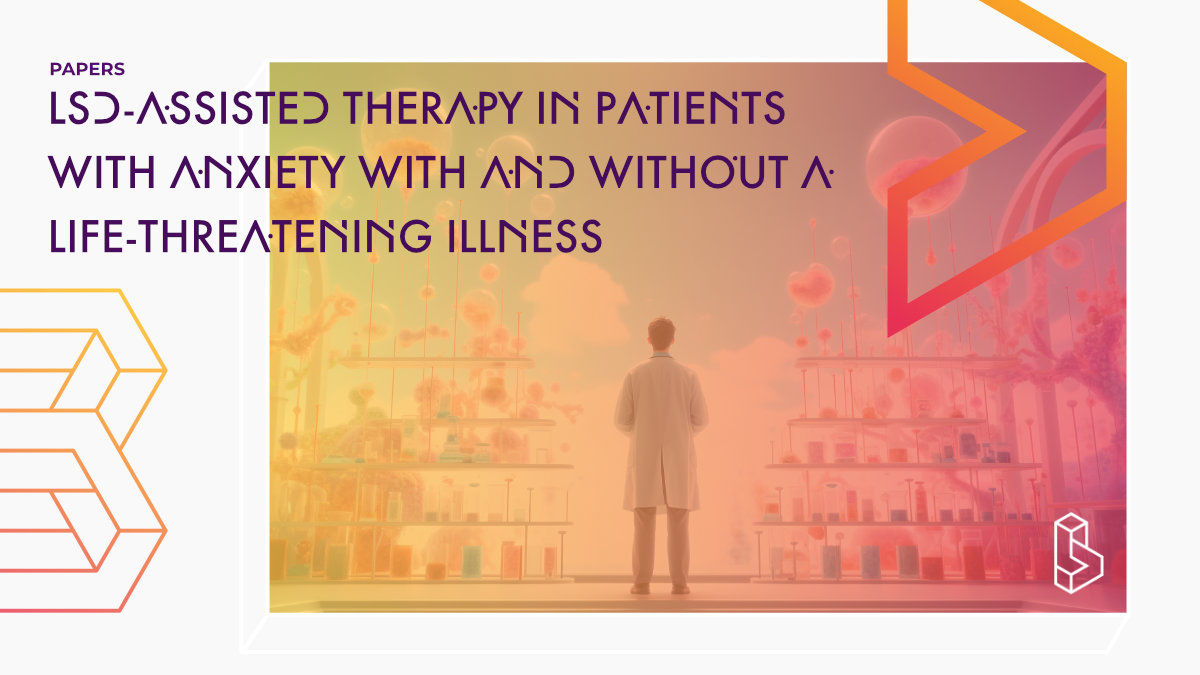This double-blind cross-over trial (n=42) finds that LSD (2x 200 μg) significantly reduced anxiety (STAI-G) scores up to three months after treatment. The patients, both with and without a life-threatening illness, also improved on measures of depression (HAM-D, BDI). Those with more subjective drug effects and mystical-type experiences had better outcomes.
Abstract of LSD-assisted therapy in patients with anxiety with and without a life-threatening illness
“Background This study aimed to investigate the efficacy and safety of lysergic acid diethylamide (LSD)-assisted therapy in patients who suffered from anxiety with or without association to a life threatening illness.
Methods The study is an investigator-initiated two-center trial that used a double-blind, placebo-controlled, two-period, random-order, crossover design with two sessions with either oral LSD (200 μg) or placebo per period. The primary endpoint was anxiety symptoms 16 weeks after the last treatment session, assessed by Spielberger’s State-Trait Anxiety Inventory–Global (STAI-G) score in 42 patients. Further outcome measures included ratings for depression symptoms (BDI [Beck Depression Inventory] and HAM-D-21 [Hamilton Depression Rating Scale]) and ratings for acute subjective drug effects. The outcomes for the first period, (between-subjects analysis) are primarily shown due to carry-over effects.
Results LSD treatment resulted in significant reductions of STAI-G scores up to 16 weeks after treatment (least square mean (± SE) change from baseline difference = -16.2 (5.8), 95% CI=-27.8 to -4.5, d=-1.18, p=0.007). Similar effects were observed for ratings of comorbid depression on the HAM-D-21 (-7.0 (1.9), 95% CI=-10.8 to -3.2, d=-1.1, p=0.0004) and the BDI (-6.1 (2.6), 95% CI=-11.4 to -0.9, d=-0.72, p=0.02). Positive acute subjective drug effects and mystical-type experiences correlated with the long-term reductions in anxiety symptoms. Transient, mild, acute untoward effects of LSD treatment were reported by eight patients (19%). One treatment-related serious adverse event (acute transient anxiety) occurred (2%).
Conclusion LSD produced long-lasting and notable reductions of anxiety and comorbid depression symptoms up to 16 weeks.“
Authors: Friederike Holze, Peter Gasser, Felix Müller, Patrick C. Dolder & Matthias E. Liechti
Summary of LSD-assisted therapy in patients with anxiety with and without a life-threatening illness
Anxiety is a common symptom of several mental illnesses and is commonly associated with cancer and other life-threatening diseases. LSD is a well-known classic psychedelic substance that induces profound acute alterations of mind and mystical-type experiences. Its effects last longer compared to those of psilocybin. LSD was used in patients with end-stage cancer to improve mood and reduce anxiety. However, modern research on the therapeutic potential of psychedelics mostly used psilocybin, and a small pilot study found trends toward reductions of anxiety up to 2 months compared with placebo.
Previous studies showed that acute effects of psilocybin and LSD on the 5D-ASC and MEQ30 scales were associated with long-term reductions of anxiety and depression. A double-blind, placebo-controlled, two-period, random-order, crossover study was conducted at the University Hospital Basel and Clinic Dr. Peter Gasser, Solothurn, Switzerland, to investigate the effects of LSD on anxiety in patients with anxiety disorders or significant anxiety associated with a life-threatening somatic illness.
Methods and Materials
Find this paper
https://doi.org/10.1016/j.biopsych.2022.08.025
Open Access | Google Scholar | Backup | 🕊
Cite this paper (APA)
Holze, F., Gasser, P., Müller, F., Dolder, P. C., & Liechti, M. E. (2023). Lysergic acid diethylamide–assisted therapy in patients with anxiety with and without a life-threatening illness: a randomized, double-blind, placebo-controlled phase II study. Biological Psychiatry, 93(3), 215-223.
Authors
Authors associated with this publication with profiles on Blossom
Felix MüllerFelix Müller is a researcher at the University of Basel. He is leading the research project on psychedelics at the Department of Psychiatry.
Peter Gasser
Peter Gasser has done work on LSD and life-threatening diseases in Switzerland since 2008. He is a psychiatrist, psychotherapist, and study lead, working in private practice.
Institutes
Institutes associated with this publication
University of BaselThe University of Basel Department of Biomedicine hosts the Liechti Lab research group, headed by Matthias Liechti.
Compound Details
The psychedelics given at which dose and how many times
LSD 200 μg | 2xLinked Clinical Trial
LSD Treatment in Persons Suffering From Anxiety Symptoms in Severe Somatic Diseases or in Psychiatric Anxiety DisordersTo test the efficacy of LSD in patients with anxiety with or without life-threatening diseases.

